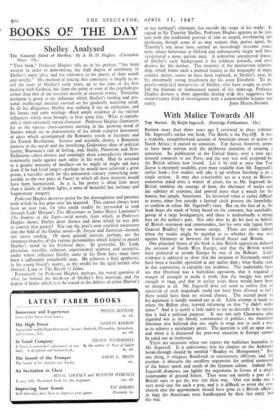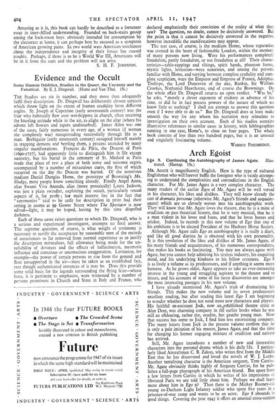With Malice Towards All
RATHER more than three years ago I reviewed in these columns Mr. Ingersoll's earlier war book, The Battle is the Pay-Off. It was a readable, straightforward account of American troops in action in North Africa ; it caused no sensation. Top Secret, however, seems to have been written with the deliberate intention of creating a sensation. Its publication in the United States, over a year ago, aroused comment in our Press and the way was well prepared for the British edition now issued. Let it be said at once that Top Secret is extremely readable, even more readable than Mr. Ingersoll's earlier book ; few readers will take it up without finishing it in a single session. It may also conceivably act as a tonic to Britons somewhat jaded after a winter of crises, for to Mr. Ingersoll the British combine the courage of lions, the obstinacy of mules and the subtlety of serpents, and proved more than a match for the honest, but simple, Americans. Its historical value is rather difficult to assess, since few outside a limited circle possess the 'knowledge to confirm or refute Mr. Ingersoll's facts. But on the face of it, the book bears the mark of being based on the common, but unreliable, gossip of a large headquarters, and there is undoubtedly a strong bias on the author's part. Not only does he do his best to belittle all British statesmen and commanders, but his own side (apart from General Bradley) by no means escape. There are times indeed when the reader might be puzzled as to whether the war was against Germany or between the United States and Britain.
One principal theme of the book is that British opposition delayed the invasion of North West Europe, and that the British would have preferred to invade Europe by way of the Balkans. Little evidence is adduced to show that the invasion of Normandy would have been a feasible operation at any earlier date ; what 'Stalin said, in this connection, is certainly not evidence. The undeniable facts are that Overlord was a hazardous operation, that it required a margin of strength to make it work, that the margin was small enough in 1944, and that in earlier years there would have been no margin at all. Mr. Ingersoll does not seem to realise that an operation of such magnitude could not have been allowed to fail ; there would have been no second chance. The second point in his argument is hardly worked out at all. Little attempt is made to refute the Balkan plan, beyond informing us that "it didn't make sense." And it is surely a little naïve to try to discredit it by saying that it had a political purpose. It was not only Clausewitz who regarded war as the bloody continuation of politics ; the American Sherman also believed that one ought to wage war in such a way as to achieve a satisfactory peace. The question is still an open one, and when it is discussed the post-war situation in Europe cannot be ruled out as irrelevant.
There are occasions when one regrets the malicious journalist in Mr. Ingersoll. It is unfortunate that his chapter on the Ardennes break-through should be entitled "Bradley vs. 'Montgomery." For one thing, it relegates Rundstedt to unnecessary oblivion, and for another, it obscures the excellent arguments for unified command of the forces north and south of the German salient. Indeed Mr. Ingersoll dismisses too lightly the arguments in favour of a sirgle commander of ground forces. They were not merely a part of a 'British ruse to get the war run their way. One can make out 3 very good case for such a post, and it is difficult to resist the con- clusion that the appointment should have gone to a British officer ; in 1943 the Americans were handicapped by their late entry into the war. Amusing as it is, this book can hardly be described as a fortunate essay in inter-Allied understanding. Founded on back-stairs gossip among the back-room boys. obviously intended for consumption by the electorate at home, it can perhaps best be excused as a symptom of American growing pains. In two world wars American touchiness about the independence and integrity of their forces has caused trouble. Perhaps, if there is to be a World War III, Americans will be in it from the start and the problem will not arise.
S. H. F. JOHNSTON.



































 Previous page
Previous page